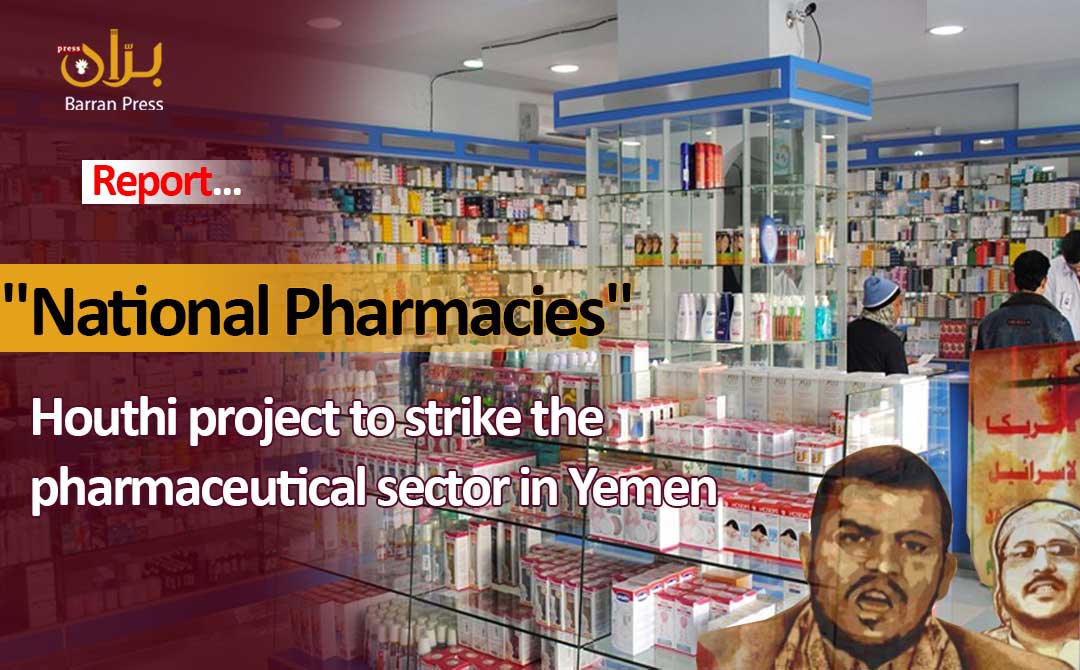
Barran Press - Reports Unit:
For the past five years, the Houthi group, internationally designated as a terrorist organization, has been establishing its own pharmacies under the name "National Pharmacies," operating under the Ministry of Health in the group's unrecognized government.
Recently, the group inaugurated several pharmacies it built within government hospitals in Sana'a, including the Al-Sab'een, Al-Thawra, and Al-Jumhuri hospitals. Through these pharmacies, the Houthis directly sell medications to citizens.
Medical sources confirmed to "Bran Press" that Houthi authorities demolished part of the Al-Jumhuri Teaching Hospital, one of the largest government hospitals in Sana'a, to construct one of these pharmacies within its premises last year.
Central Focus
Houthi leader Taha Al-Mutawakel, appointed by the group as Minister of Health in the dismissed "Ben Habtoor" government (unrecognized), announced the group's intention to implement this project in late 2019, during a ceremony in Sana'a marking "World Pharmacists Day."
According to Al-Mutawakel, a fervent preacher for the Houthi group, the project would not be limited to Sana'a but would encompass other governorates under their control. He justified the move as a means to "sell medication at cost, ensuring product quality and effectiveness," without addressing its devastating impact on the private sector.
On May 17, 2024, the head of the group's so-called "Supreme Political Council," Mahdi Al-Mashat, directed the completion of "National Pharmacies" across all governorates of the republic, recognizing their "importance in providing medicines and treatments for patients in hospitals and healthcare facilities."
Comprehensive Control
Informed sources explained that this move "is part of the group's efforts to privatize government sectors on multiple fronts, across all sectors and institutions, particularly the health sector, including hospitals and pharmaceutical institutions."
Many Yemeni pharmacists in Sana'a condemned these measures, calling them "irresponsible" and highlighting the resulting harm they would face. They described the group as "greedy and opportunistic, competing with the common people for their livelihoods," pointing out their aim of "illegitimate enrichment."
A performance report issued by the Houthi-controlled Ministry of Health, covering the period from 2020 to 2023, revealed that the Supreme Drug Authority established "buildings for National Pharmacies, totaling five in the capital, at a cost of 286 billion, 364 million, and 800 riyals, with work ongoing to complete the rest of the governorates."
Full control
Sources familiar with the situation have revealed that this move is part of a broader strategy by the Houthis to privatize government sectors, particularly the healthcare sector, and exert complete control over healthcare resources. This includes the takeover of hospitals and pharmaceutical institutions.
Yemeni pharmacists in Sana'a have condemned these actions, calling them "irresponsible" and highlighting the detrimental impact they will have on their livelihoods. They accuse the Houthis of being "greedy and opportunistic," competing with ordinary citizens for their livelihood and using their power to enrich themselves through illicit means.
Competition with Citizens
Aziz Ahmed, a scientific representative for a pharmaceutical company in Sana'a, expressed his outrage, stating that the Houthi-controlled Ministry of Health is "competing with ordinary citizens in selling medication." He described the situation as a time of "gang rule" where the Houthis govern through force and implement a policy of total economic control.
"If the authorities are involved in trade and are also the regulators, the citizens will have no one to defend them," Ahmed said. He criticized the Houthis for prioritizing their own economic gain over addressing the critical shortage of essential medicines. He explained that pharmaceutical companies are forced to comply with the Houthis' demands when supplying medication to their government pharmacies, including accepting returned expired medications. Failure to comply results in the Houthis blocking the import of their products through the Supreme Drug Authority, which they also control.
Crushing the Private Sector
Mohammed Hamed, a pharmacist working at a pharmacy in Sana'a, echoed these concerns, stating that the opening of Houthi-affiliated pharmacies is "devastating the private sector." He explained that pharmacies located near the government hospitals are being forced to close down or convert into grocery stores due to the inability to compete with the Houthi-controlled pharmacies.
Hamed emphasized that the opening of these government pharmacies has exacerbated the already dire situation in the pharmaceutical market, which is characterized by stagnation and a lack of purchasing power among the people. He lamented that the Houthis are effectively "harassing" pharmacists and engaging in money laundering, with the sole beneficiaries being a select group directly affiliated with the Minister of Health.
The Houthi group's actions have raised serious concerns about the future of the pharmaceutical sector in Yemen. Their blatant disregard for private businesses and their focus on enriching themselves at the expense of the people are further exacerbating the humanitarian crisis in the country.
Looting and Monopoly
Mohammed Salem, a member of the Pharmacies Owners Union, revealed that the Houthis' newly established pharmacies are primarily used to sell scarce and smuggled medication. He also accused them of stealing free medication donated by international organizations and reselling it through their own pharmacies.
"The same goes for medication confiscated from small pharmacies," Salem explained, adding that the Houthis are ultimately aiming to "expand their business and gain complete control over various economic sectors."
Despite the wealth amassed by officials within the Houthi-controlled Ministry of Health, Salem criticized their decision to compete with ordinary citizens, calling it "the height of chaos, especially when traders and corrupt individuals are at the helm of the Ministry of Health."
He argued that it is "natural" for a service ministry to be transformed into one focused on amassing wealth and profiting from it.
Silence of the Union
Many pharmacists in Sana'a expressed their frustration with the lack of action from the Yemeni Pharmacists Union, which is mandated to defend their rights. They questioned the union's silence, wondering why there haven't been any protests, slogans, condemnations, statements, or strikes.
A member of the Yemeni Pharmacists Union in Sana'a, who requested anonymity for security reasons, admitted that the union's role has been reduced to "simply registering names, issuing membership cards, and collecting fees."
He explained that the Houthi authorities effectively control the union, suppressing any dissent. "Those who dare to speak out are silenced, persecuted, or hunted down," he said. "Even criticism is no longer effective and can be more harmful than helpful."
He concluded that the union members are "exhausted" and choose to remain silent in the face of rampant corruption that operates above the law and through force.
Violation of Law
The union member condemned the Houthi authorities' decision to establish their own pharmacies as a "violation of the constitution and the law." He emphasized that the law prohibits the state from creating private pharmacies that compete with pharmacists in selling medication.
He described the Houthis' actions as "opportunistic and unjust," aimed at "gaining widespread control over the market and tilting the economic scales in favor of the ruling group."
Seizing Everything
The Houthis' control extends beyond the pharmaceutical sector, encompassing the Supreme Drug Authority, the Medical Council, and other vital institutions. They have also dominated the unions of doctors, pharmacists, drug manufacturers, and community pharmacy owners.
Sources revealed that the Houthis have seized control of several pharmaceutical factories, leveraging their wealth to establish their own pharmaceutical companies and stifle competition, disregarding regulations and laws.
The Houthis have gone further, enacting laws and regulations that solidify their control and humiliate their competitors in the market. They have imposed unfair conditions and fees, making it risky to open a medical center, pharmacy, laboratory, or clinic.
Unprecedented Abuse
Previous reports have documented unprecedented abuses committed by Houthi authorities against the pharmaceutical sector, particularly after the appointment of Taha al-Mutawakel as Minister of Health.
Al-Mutawakel admitted to closing 432 pharmacies, claiming they were unlicensed, and referring 75 others to the Public Funds Prosecution.
These practices are compounded by the kidnapping of dozens of pharmacists and the extortion of vast sums of money from pharmacies and pharmaceutical companies.
The Community Pharmacy Owners Union, in a statement published on their official Facebook page, accused the Houthis of practicing abuse and extortion through the Health Office in the capital. They emphasized that the measures taken against many pharmacists are illegal and negatively impact the reputation of the pharmaceutical sector.





